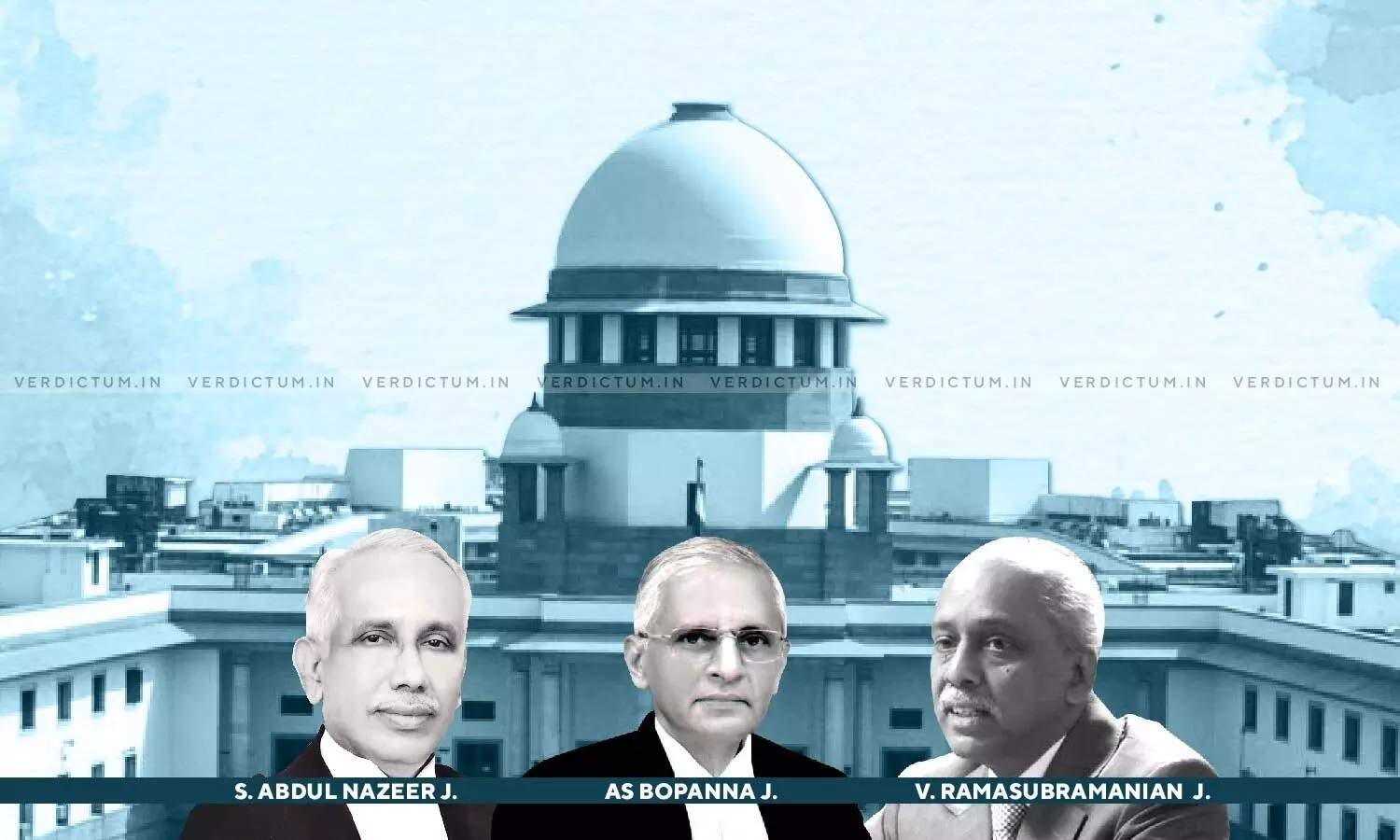
Investigation Not Properly Conducted, Injustice Done To Family- SC Acquits Man Convicted Of Murder And Rape Of 6-Year-Old
 |
|The Supreme Court has acquitted a man who was sentenced to death for allegedly murdering and raping a six-year-old girl.
The Bench of Justice S. Abdul Nazeer, Justice A.S. Bopanna and Justice V. Ramasubramanian held that the investigation of the case was not conducted properly due to which injustice has been done to the family of the victim.
The Court also held that by fixing the culpability upon the Appellant-Accused without any shred of evidence that will stand the scrutiny, the prosecution has done injustice to the accused.
While holding so, the Bench added –
"Court cannot make someone, a victim of injustice, to compensate for the injustice to the victim of a crime."
The Court on considering the reasoning of the Trial Court as confirmed by the High Court observed that sufficient care was not taken in the assessment of the statements made by the witnesses.
The Court observed –
"No one spoke as to who sent the FIR to the court andvwhen it was sent. Strangely even the copy of the postmortem report was admittedly received by SHO on the 13.03.2012 though the post mortem was conducted on the 09.03.2012. It was the same date on which the FIR reached the Court. These factors certainly create a strong suspicion on the story as projected by the prosecution, but both the Courts have overlooked the same completely. This erroneous approach on the part of the Sessions Court and the High Court has led to the appellant being ordained to be dispatched to the gallows."
The Appellant-Accused was convicted for the offences under Sections 302 and 376 IPC and sentenced to death by the Sessions Court, which was also confirmed by the High Court on reference and an appeal.
Aggrieved, the Appellant had approached the Supreme Court.
Senior Counsel S. Nagamuthu appeared for the Appellant while AAG Ardhendumauli Kumar Prasad appeared for the State of Uttar Pradesh before the Apex Court.
The Court noted that the Prosecution of the Appellant was based on circumstantial evidence and further placed reliance on Sharad Birdhichand Sarda vs. State of Maharashtra in this context.
The Court further also noted that even on the question as to how the first information was given to the police, there are different versions.
While considering the different statements of the witnesses, the Court noted that there were contradictions and observed, "it remains a mystery as to whether the dead body was ever taken to the police station and if so, how, when and why."
The Court observed, "Unfortunately, the Sessions Court as well as the High Court have trivialized these major contradictions to hold that the chain of circumstances have been established unbroken."
Furthermore, the Court held that there was a delay in transmitting the FIR to the Court.
In this context, the Bench placed reliance on precedents and observed –
"It is clear from the aforesaid decisions that the delay in forwarding the FIR may certainly indicate the failure of one of the external checks to determine whether the FIR was manipulated later or whether it was registered either to fix someone other than the real culprit or to allow the real culprit to escape. While every delay in forwarding the FIR may not necessarily be fatal to the case of the prosecution, Courts may be duty bound to see the effect of such delay on the investigation and even the creditworthiness of the investigation."
The Court thus noted that where ocular evidence is found to be unreliable and thus unacceptable, a long delay has to be taken note of by the Court.
"The mandate of Section 157(1) of the Code being clear, the prosecution is expected to place on record the basic foundational facts, such as, the Officer who took the first information report to the jurisdictional court, the authority which directed such a course of action and the mode by which it was complied. Explaining the delay is a different aspect than placing the material in compliance of the Code," the Bench added.
Thus, the Court held, "Therefore, we hold that the delay of 5 days in transmitting the FIR to the jurisdictional court, especially in the facts and circumstances of this case was fatal."
The Court held that despite the fact that it was a shocking case of rape and murder of a six-year-old girl, the prosecution did not care to subject the accused to examination by a medical practitioner.
"In cases where the victim of rape is alive and is in a position to testify in court, it may be possible for the prosecution to take a chance by not medically examining the accused. But in cases where the victim is dead and the offence is sought to be established only by circumstantial evidence, medical evidence assumes great importance. The failure of the prosecution to produce such evidence, despite there being no obstacle from the accused or anyone, will certainly create a gaping hole in the case of the prosecution and give rise to a serious doubt on the case of the prosecution," the Bench observed.
The Court also held, "We cannot shy away from the fact that it is a ghastly case of rape and murder of a 6 year old child. By not conducting the investigation properly, the prosecution has done injustice to the family of the victim. By fixing culpability upon the appellant without any shred of evidence which will stand the scrutiny, the prosecution has done injustice to the appellant. Court cannot make someone, a victim of injustice, to compensate for the injustice to the victim of a crime."
The Court thus allowed the appeals and directed for the release of the Appellant.
Cause Title - Chotkau v. State of Uttar Pradesh
Click here to read/download the Judgment